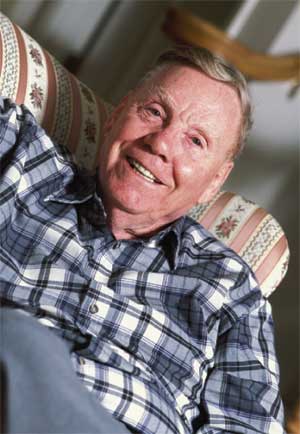Cannon had served as deputy chief of staff for personnel, U.S. Army Europe and Seventh Army just prior to his retirement. Today, he not only remains active in his local community--Patriot's Colony in Williamsburg, Va.--he's actually one of that community's founding fathers. And he is equally active in supporting his alma mater--so much so that he recently received the 2004 University Distinguished Achievement Award at Tech's annual Founders Day ceremonies held on the Blacksburg campus. The general's involvement with Patriot's Colony was underway long before ground was even broken for the community, and his post-graduation support of Virginia Tech dates back nearly to the day he traded cap and gown for Army green. Cannon first became interested in the Patriot's Colony project late in the fall of 1988, about a year after he had retired. "I was approached by a couple of retired Army colonels who were interested in exploring the feasibility of establishing a continuing care retirement community for retired military officers," Cannon recalls. "In light of my previous service involvement with community development and operations, they felt that I could contribute to the project. But beyond that, the whole concept really excited me." As a starting point, the core group of hopeful founders visited a somewhat similar type of community already operating in San Antonio. "It provided a sort of prototype for us to model," Cannon says. "Next, we conducted a feasibility study to identify a suitable site for our community. We preferred a location somewhere on the Virginia Peninsula, and the Williamsburg area, with its nationally known name and attractions, ranked as the most desired, logical, and attractive choice. "We also had to decide just what type of community it should be. One option would have been to go for a hospitality-oriented community, complete with all the various amenities traditionally associated with such places. The other logical option would feature a health-related focus, in keeping with the needs of the age group that would comprise the proposed community's residents." After much study and discussion, Cannon says the group decided on the health-and-medical focus. "We contacted Riverside Regional Medical Center in nearby Newport News, Va., to see how they might be able to support the needs of our future residents. In effect, Riverside became our consulting partner in the early stages of the project. Later, Riverside officers found the whole concept so attractive that, in 1997, they provided the financing needed to underwrite the entire project. Now, in fact, they own the property!" Attracting new residents to the aptly named Patriots Colony has not been a problem, according to Cannon. "The only advertising we ever did was in a retired officers association magazine, and that's really all we needed. We have over 260 apartments, homes, and villas, and they're all full now. And we have a long waiting list of prospective new buyers that assures the future vitality of the community. We're proud to offer a living environment that provides a comfortable and caring lifestyle for its residents--all of whom have devoted their earlier lives to serving their nation." Today, Cannon serves as chairman of the board of directors of Patriots Colony, an unpaid group of elected volunteers. His long-term efforts on behalf of the community have been commemorated in tangible and enduring form at the Cannon Community Center, which is named in his honor. Archie Cannon's community involvement, however, does not stop at the landscaped entrance to Patriots Colony. "I stay involved with other civic projects," he says, "including the establishment of the nation's newest national park--Green Spring Park. Green Spring is the area where colonial governors had their residence during the time of the American Revolution. "I'm also involved with Child Development Resources, a nonprofit agency that provides services to young children and their families living in the Williamsburg area, and I participate in the Crown Colony Club, a men's civic club." As if he didn't already have enough to occupy his time, Cannon also remains active with his alma mater. He served as fundraising chair for the 50th reunion of Tech's Class of 1950 and was instrumental in helping to raise a total of $1.2 million for a mathematics professorship, a corps of cadets scholarship, and improvements earmarked for University Libraries. He also personally supports Tech's Pamplin College of Business and the athletic programs. Cannon takes special pride in being an active and supportive alumnus. "When I graduated from Virginia Tech, I had no viable job prospects lined up. Fortunately--or unfortunately, depending on one's perspective--the Korean conflict erupted and I was called to active duty. After serving there, I got out of the Army for a brief time, but by 1955, I was right back in. But even during those lean early years in my career, I never lost touch with the Alumni Association, and I have always tried to support their activities, both financially and through direct participation." It's only natural that the general retains a special fondness for the Virginia Tech Corps of Cadets. "I most enjoy my development activities with the corps. I see no reason why the corps shouldn't have 1,000 cadets in its ranks and, of course, I truly believe the need for these trained and highly committed leaders has never been greater than it is today. In my many years in the Army, and having served in some 27 different locations over those years, I learned that Virginia Tech Corps of Cadets graduates are highly regarded everywhere, both in and outside the armed forces." Although Archie Cannon is far too self-effacing to admit it himself--assuming he could even find the time to accept such laurels--there's little doubt that others in the Virginia Tech family regard him as a most fitting example of just why corps graduates have earned their excellent reputation. Allan Miller is an editor in University Relations. |
